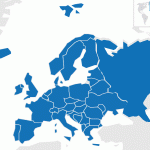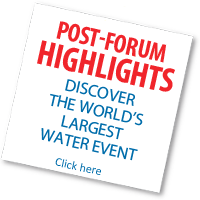


The Regional Process
EUROPE Region
Geographical Scope
 • European Union
• European Union
• Balkans
• Eastern Europe
• Caucasus
• Central Asia
• All European countries adhering to the UNECE Convention of 1992
Background
During the 4th World Water Forum in 2006, the European process generated a number of recommendations on water scarcity and droughts, stressing the need to invest substantially in real-time monitoring, scenario modelling and data-collection activities in order to increase preparedness, improve forecasting extreme events’ frequency and intensity, and provide early warning systems. The European regional report at the Istanbul’s 5th World Water Forum was the occasion to emphasize, in line with the motto of “bridging divides”, the issues of financing, water efficiency, cost recovery, as well as the issues of river basin management and access of the poor to drinking water and sanitation.
The European regional process
Europe is the continent that has the greatest number of transboundary rivers, lakes and aquifers. Many European countries have thus developed tools and techniques of effective water management at the level of large river basins and the level of community utilities (for the control of individual uses). At the continental level, the UNECE “Helsinki Convention” for example, has been applied since 1992 for transboundary water management in Western, Central and Eastern Europe, the Caucasus, as well as in Central Asia. The “London Protocol for Water and Health” was later added to this UN Convention. Within the European Union, many directives have organized water management (resources, ecosystems and uses), such as the Water Framework Directive since 2000, and set up ambitious objectives and constraining procedures and deadlines for the member states. The European process will build on these existing tools, and promote the good practices in order to gather commitments on the targets that are common to the continent.
The European Regional Process Steering Committee and its partner organizations gathered during the first Synthesis Meeting held in Brussels (Belgium) on 21 December 2010, and on the occasion of the 2nd Stakeholder Meeting of the 6th World Water Forum on 18 January in Paris, France. While the process will further refine the scope, approaches, partners and stakeholders, through an intensive participatory process, it has already reached an agreement to prioritize twelve Specific Europe Region Priority Targets (SERPT).
Priorities and Targets in the region
- EU1 - Good practices for transboundary water cooperation in Europe
By 2015, in the UNECE region, develop new or revised agreements on transboundary rivers, lakes and groundwaters, create new joint bodies and improve compliance of the UNECE Water Convention through new State ratifications and the launch of an implementation mechanism
- EU2 - Achieve the good ecological status of European water bodies
By 2027, in the European Union and beyond, achieve a good ecological status of water bodies.
- EU3 - Adapt to long term water challenges linked to Climate Change and prevent extreme phenomena
By 2020, in the Pan-European region, most governments and transboundary basins have developed (transboundary) climate change adaptation strategies and are implementing them
- EU4 - For a water-friendly European agriculture
By 2030, enable farmers to adopt best practices and achieve a water-friendly agriculture, particularly through research and innovation, in order to adapt to climate changes and to meet the food needs of a growing population.
- EU5 - Inland Water ways, a multi-usage network
By 2020, complete a trans-European inland navigation network through the definition of a European strategy taking into account best practices and innovative technologies.
- EU6 - Better coordinate water and renewable energy policies: the sustainable hydropower example
By 2020, adopt at European level a legal instruments defining rules for the development of sustainable hydropower production
- EU7 - Access to the drinking water and sanitation for underprivileged populations in Europe
By 2020, achieve the goal of 100% access to drinking water and sanitation services for the currently unprivileged population of Europe.
- EU8 - Promoting sustainable financing of water and sanitation in Europe
By 2020, increase by 50% the number of water management authorities which have implemented water pricing following OECD’s 3T approach
- EU9 - Protection and restoration of European water ecosystems
By 2015 support a number of at least 3 integrated river basin management plans to include river and water ecosystem restoration measures and/or river restoration projects pilot projects and/or river restoration plans.
- EU10 - Promote Science-Policy interface in European water management
By 2020, develop a European leadership in science-policy interface and dialogue between researchers and water managers, technology innovation, dissemination and exploitation of research results for European growth and competitiveness
- EU11 - Adapt Water management to the specificities of European outermost regions
By 2020, develop a set of institutions (networks, training centers, knowledge hub) dedicated to improve water management in the specific context of European outermost Regions (OMR)
- EU12 - Develop European cooperation with Third Countries in the water field
By 2015 and beyond, the renewed European Union Water Initiative provides platform for coordination and dialogue with different partner regions
Regional Coordinator and key partners
 Regional Coordinator
Regional Coordinator
Jean-Francois Donzier
International Office for Water (IOWater)
http://www.oieau.org
Key partners (this list is as present)
UNECE, European Commission, European Parliament Council of Europe, INBO, Ministry of Natural Resources and Environment (Russian Federation); EC-IFAS, REC Caucasus, CENN, GWP Med, Secretariat of the European International Rivers Commissions, European Centre for Rivers Restoration, European Water Association, ONEMA, Solidarity Water Europe, EUREAU, EURELECTRIC, Société Hydrotechnique de France, WSSTP, IWRM Net Consortium, Network of Regional Government for Sustainable Development, COPA – COGESA
For more information, email us at: europe@worldwaterforum6.org
| Previous: Asia-Pacific Region | Next: Mediterranean Cross-continental Process |






